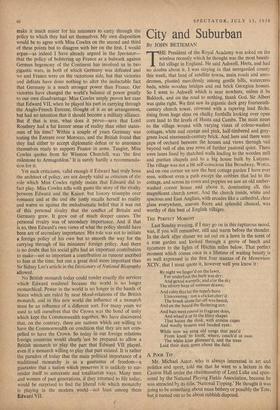City and Suburban
BY JOHN BETJEMAN THE President of the Royal Academy was asked on the wireless recently which he thought was the most beauti- ful village in England. He said Ashwell, Herts, and had no doubts about it. I was staying in that unregarded county this week, that land of satellite towns, main roads and aero- dromes, planted mercilessly among gentle hills, watercress beds, white wooden bridges and red brick Georgian houses. So I went to Ashwell which is near nowhere, unless it be Baldock, and on the road to nothing, thank God. Sir Albert was quite right. We first saw its gigantic dark grey fourteenth- century church tower, crowned with a tapering lead fleche, rising from huge elms on chalky foothills looking over open corn land to the levels of Hunts and Cambs. The main street to the village wound with varying vistas of colour-washed cottages, white and orange and pink, half-timbered and grey- green local nineteenth-century brick. And here and there were gaps of orchard between the houses and views through veil beyond veil of elm tree rows of further pastoral quiet. There were lanes lined by thatched walls leading to the wooden mill and puritan chapels and to a big house built by Lutyens. The village was not a bit self-conscious like Broadway, Worcs, and on one corner we saw the best cottage garden I have ever seen, without even a path except the cobbles that led to the cottage, and across its roses and poppies we saw an old umber- washed corner house and above it, dominating all. this magnificent church tower. And the church inside, white and spacious and East Anglian, with arcades like a cathedral, clear glass everywhere, uneven floors and splendid chancel, was worthy of this best of English villages.
THE PERFECT MOMENT
Last Sunday evening, if I may go on in this rapturous mood, was, if you will remember, still and warm before the thunder.
In the dark after dinner we sat out on a lawn in the scent of a rose garden and looked through a grove of beech and sycamore to the lights of Hitchin miles below. That perfect moment which comes once in a lifetime of waiting beauty. is so well expressed in the first four stanzas of In Memoriam XCIV, that I must quote it, however well you know it : By night we linger'd on the lawn, For underfoot the herb was dry: And genial warmth; and o'er the sky The silvery haze of summer drawn; And calm that let the tapeis burn Unwavering : not a cricket chired : The brook alone far-off was beard, And on the board the fluttering urn : And bats went round in fragrant skies, And wheel'd or lit the filmy shapes That haunt the dusk, with ermine capes And woolly breasts and beaded eyes : While now we sang old songs that peal'd From knoll to knoll, where, couch'd at ease, The white kine glimmer'd, and the trees Laid their dark arms about the field.
A POOR TIP


































 Previous page
Previous page